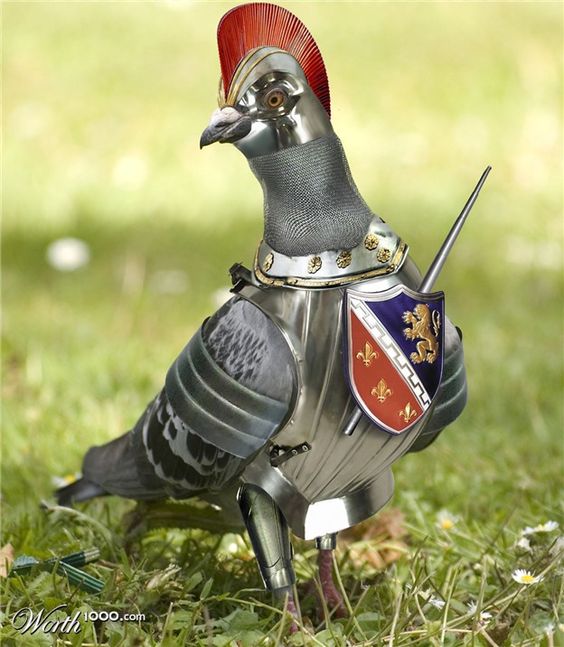I love how humans try to get their hobbies turned into work. After all, that’s a perfectly valid objective, and it lets you “play” and get paid for it.
At Bletchley Park [stderr] there was a small room in one of the huts, devoted to pigeons in the war. They were a crucial communications system in WWI, though I was quite uncomfortable about the discussion of how many redundant pigeons were needed, due to artillery and predators.

One of the first things that began my eventual disenchantment from warfare was thinking about the experiences of horses in war. After getting to know some horses, and seeing how horse-minds seem to work, I realized that they’re generally cautious and gentle creatures (except a stallion in his territory) who would be quite content to stand around and eat and get fat – it takes a human to convince them that charging at cannon is a good idea. And, what a horrible surprise for the horse!

Ghost Dog sending SMS messages
It seems a bit odd to me that someone can love pigeons, in the abstract, and yet use them as a tool in humanity’s stupid games.

(original author unknown, I grabbed this off a google image search)
Yes, the militarization of the pigeon goes back a long way. This is one of the French pigeons before Agincourt. Unfortunately for them, their armor was so heavy they couldn’t fly, and they were mowed down by English longbowmen as they stomped resolutely forward. And then they were baked into pies.

I believe it is Glubb Pasha in one of his history books on the Middle East who describes cages of homing pigeons heading North along the Eastern Med coast with the rest of the army in the 15th or 16th century to help (whatever dynasty?) stay closely in touch with Cairo.
It was probably safer in those days, with only the occasional archer or falcon to dodge.
Must have been a great relief for the English. Imagine having to fight off a small, agile pidgeon with a sword or, much worse, a heavy, unwieldy pike. They’d peck out your liver while you’re still on the backswing.
These days they’d probably have to survive ground-to-bird missile batteries and F-16 Falcons (with debatable effectiveness)
komarov@#2:
they’d probably have to survive ground-to-bird missile batteries
The US’ ground-to-bird missiles are named the hawk. Coincidence? I THINK NOT!
These days they’d probably have to survive ground-to-bird missile batteries and F-16 Falcons (with debatable effectiveness)
I am betting on the pigeons. Small mass, low thermal signature, good maneuverability. An F-16 does not even have a chance. WWI was like flying through a hailstorm. Nothing like the current situations.
Do you know if ground-to-bird missile batteries are being developed? Shotguns excluded, of course. Falcons and other birds might be an alternative. They have been effective at various airports.
jrkrideau@#5:
Do you know if ground-to-bird missile batteries are being developed?
In “Sidewinder: creative missile development at China Lake” (maybe should be on my recommended reading list) there is an account of Wes McLean developing an early prototype infrared homing system, and hooking it up to an antiaircraft gun so it could be shown to some brass. The story goes that the brass were standing there while McLean talked and stalled until one of them lit a cigarette and the antiaircraft gun suddenly came to life and started tracking the cigarette. He got his funding. Apparently there was a concern at one point that the missile’s homing systems could be made sensitive enough to track a bird, so they had to calibrate them by trial and error until they’d track a jet exhaust but not a bird or a full bird colonel. [that was a fun little bit, maybe I should dig it up and post that story]
I know a guy who had a private airport who had problems with Canada geese wandering about in toques saying “ey” and leaving beer cans, so he got an aussie shepherd dog and there was never again a goose that went un-barked-at.
No mention of Project Pigeon?
Or of Hatoful Boyfriend?